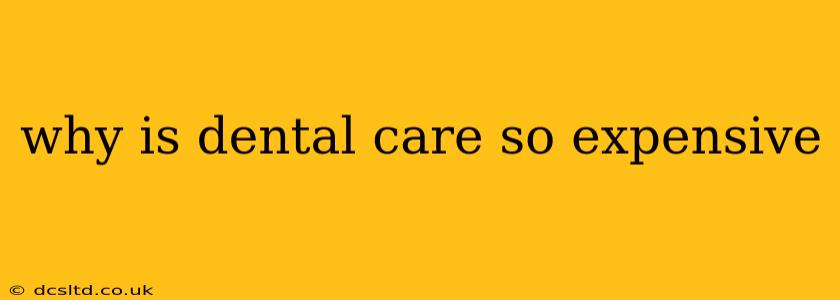Dental care costs are a significant concern for many people worldwide. The seemingly exorbitant prices often leave patients wondering what contributes to the high expense. Understanding the factors behind these costs is crucial for making informed decisions about your oral health. This article delves into the various elements that contribute to the high cost of dental care, providing insights into why maintaining a healthy smile can be so pricey.
What Factors Contribute to High Dental Costs?
Several intertwined factors contribute to the high cost of dental care. These range from the education and training required for dental professionals to the advanced technology used in modern dentistry. Let's break down the key contributors:
1. The High Cost of Education and Training:
Becoming a dentist requires years of rigorous education and training. Students accumulate substantial debt during dental school, which they must then recoup through their practice. This debt directly influences the fees they charge patients to cover their expenses and make a living. The specialized training for orthodontists, periodontists, and other dental specialists further increases the cost of these services.
2. Advanced Technology and Equipment:
Modern dentistry relies on advanced technology and equipment. Digital X-rays, intraoral cameras, CAD/CAM technology for creating crowns and other restorations, and laser dentistry all contribute to the overall cost. These technologies, while improving accuracy and efficiency, represent significant upfront investments for dental practices. The ongoing maintenance and updates for this equipment also add to the operational expenses.
3. Insurance Coverage and Reimbursement Rates:
Dental insurance plans often don't cover the full cost of procedures. Insurance companies negotiate reimbursement rates with dental providers, sometimes significantly lowering the amount dentists receive for their services. This means dentists need to charge higher fees to compensate for the lower reimbursements and remain profitable. The complexities of insurance claims processing add another layer of administrative cost to the practice.
4. Overhead Costs of Running a Dental Practice:
Operating a dental practice incurs significant overhead costs. These include rent or mortgage payments for the office space, staff salaries (hygienists, assistants, receptionists), utilities, insurance (malpractice insurance is a considerable expense), marketing and advertising, and lab fees for creating dentures, crowns, and other prosthetics. All these costs contribute to the final price patients pay.
5. The Complexity of Dental Procedures:
The complexity of different dental procedures significantly impacts their cost. A simple filling is far less expensive than a root canal, implant surgery, or extensive orthodontic treatment. The time, skill, and materials required for more complex procedures naturally increase the overall expense. Specialized procedures, like those involving oral surgery or implantology, often command higher fees due to the surgeon's expertise and the use of advanced technology.
Why is dental insurance so expensive?
Dental insurance, while helpful, isn't a panacea for high dental costs. The premiums are influenced by the factors affecting dental care costs as a whole, namely the high cost of treatment. Additionally, insurance companies need to cover their administrative costs and generate a profit. The specific coverage offered by a dental insurance plan also affects the premium. Comprehensive plans, naturally, tend to be more expensive than basic plans.
What can I do to reduce dental costs?
Several strategies can help manage dental expenses:
- Preventive Care: Regular checkups and cleanings can prevent more costly problems down the line.
- Negotiate Payment Plans: Many dental practices offer flexible payment options.
- Shop Around: Compare prices from multiple dental practices in your area.
- Consider Alternative Options: Explore options such as dental schools or community health clinics, which may offer reduced rates.
By understanding the factors that contribute to the high cost of dental care, patients can make informed decisions about their oral health and find ways to manage expenses effectively. Remember, investing in your oral health is investing in your overall well-being. Proactive care can often save you money in the long run by preventing more costly procedures.
